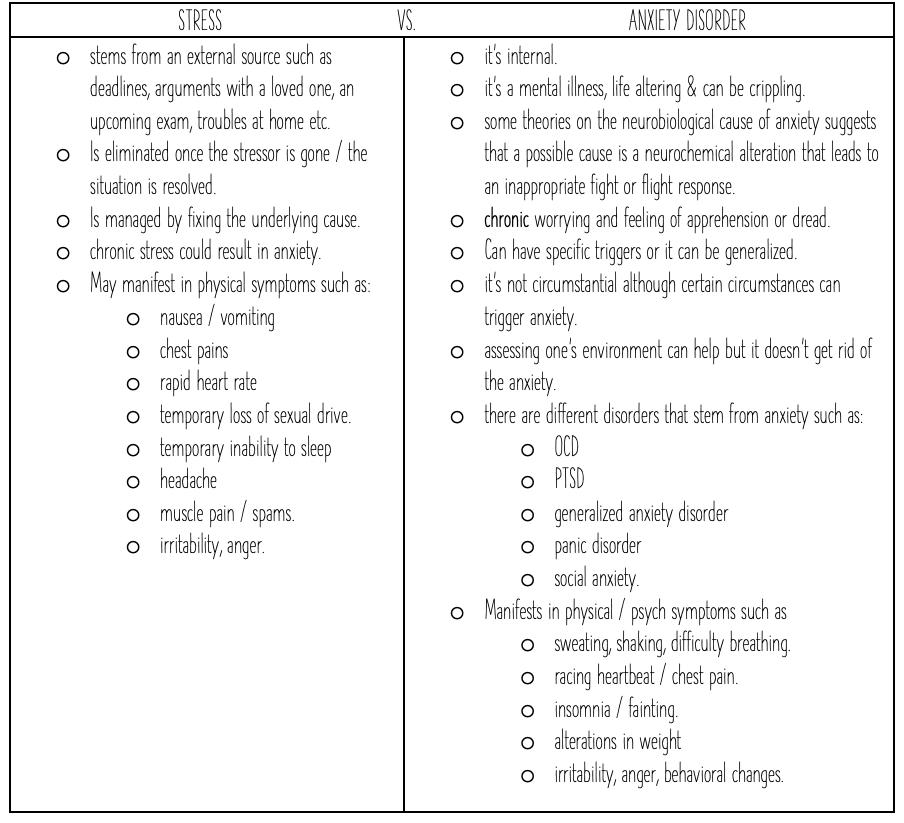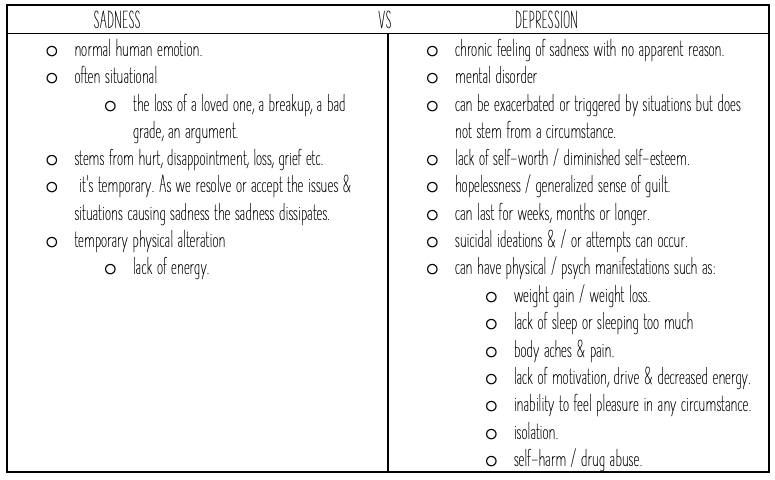
When discussing mental illness specifically anxiety & depression, which is todays topic of conversation, it is important to truly understand what these disorders mean & how they differ from sadness &/or everyday stress.
Having this understanding is essential to avoid wrongful self-diagnosis, dismissive self-talk as well as dismissive speech & behaviors towards others. Understanding these differences is an important & helpful way to better understand how these conditions affect us & others, as well as aid us in becoming better allies to the people in our lives who might be struggling with these mental illnesses.


Now that we understand some of the major differences between normal human reactions / emotions & mental illness, it is important to also keep in mind that anxiety & depression significantly affect the quality of life of those who suffer from them. Bouncing back from struggles can be a very tough journey. As someone who has been diagnosed with both GAD / a panic disorder & AD I know from experience how tough it can be to battle one’s mind on a regular basis, in trying times, such as our current reality, it can be even tougher & it can truly feel all-consuming.
The pandemic has left everyone in uncertainty, so many altered life plans, people have lost their jobs, a lot of people have lost their loved ones; needless to say, it has left almost everyone feeling overwhelmed & on edge. Adding to that chaotic energy, the year 2020 in its entirety, has proven to be . . . well, I N T E N S E to say the least. Riots, societal & humanitarian crisis, political clownery, COVID 19, fires, earthquakes etc. The world seems to be in shambles, that’s tough for most humans to deal with & for those of us with mental illness this has definitely been a very dark period.
So how do we handle this? Like I said, most of this comes from research but a big chunk comes from personal experience. I know what it’s like to be in a very dark corner, but I also know what it’s like to turn things around. Don’t worry, I’m not about to spiel some toxic positivity bull crap. The reality is that we must deal with our mental health every day, things are not going to get better by simply chanting affirmations & positive quotes. Don’t get me wrong, those help but in order to get the job done you need active effort. That means putting in the work, pushing through, calling yourself out, reflecting on your actions & thoughts, developing self-awareness & using everyday as an opportunity to break through old toxic habits, behaviors & thought processes all the while recognizing that your anxiety is not going to disappear but you will be able to feel a little bit more in control. Having said this I think it is also important to honor the bad the days, sometimes we are not going to be able to handle what’s been thrown our way & that’s ok, we take in the bad days with the good days but we never stop working on ourselves.
Onto some ways you can canalize your anxieties &/ or depression during this time:
1. Journaling
- I know you’ve seen this everywhere, but it truly helps. When I first decided that I needed somethings to change in my life this is the first thing that I did. I grabbed a notebook and I filled the first page with positive things about myself, I used this exercise to remind myself that I do have good qualities & I should honor them. On the second page I reflected & wrote all the behaviors I would engage in that I wanted to change & that were causing me distress or problems with myself or others. That’s how it all started, after that, I wrote on the journal every day & made it a point to work on modifying the behaviors I had already identified as “not so great”
- This exercise opened a window into my own self, it helped me exercise self-awareness, identify negative coping mechanisms, thoughts & behaviors as well as identified triggers & people that were detrimental to my mental health & overall growth.
- I started journaling years ago & to this day I find great comfort in it. It’s not only a great tool for self-reflection but it’s also a great way to decompress and put on paper all your anxious thoughts.
2. Exercise! … I know I know but read me out.
- This is another one you’ve heard before but again it has proven essential. Especially during this time where there are still lockdowns in so many places, isolation can make our mental health plummet even more. Even if it’s for a short walk, get out of your house – WITH A MASK ON PLEASE- Use this opportunity to connect with yourself & nature. Make a fun playlist & get out for a while. Suck in the sunshine, the trees, the birds & for a few minutes just exist. It’s not only good for your body but It’s also wonderful for the mind.
- Exercising releases “feel good” hormones such as endorphins, which can help boost our mood. It can also prove to be meditative, aiding in relaxation of the mind & body. If anything, use exercise to cope with your anxiety/ depression. Let’s say you’ve identified an unhealthy coping mechanism actively try to switch that with a healthier way to cope such as going for a walk, run, doing exercises at home etc.
- take care of the body & it will take care of the mind.
- If you are not able to go outside do some stretches at home, the point is to get the body moving for a bit.
3. take a moment for gratitude & positive reflection.
- I’m not about toxic positivism, I believe that every emotion has a purpose & we should honor it, explore it & allow it to pass, however, anxiety & depression can make us hyper focused / hyperaware of everything that feels threatening or negative. Chronic hyper fixation on negativity takes a toll & it sinks us even further into our dark holes, so I do think it’s important to take a moment of the day to reflect on the positives in our lives. At times, upon reflection we can even identify pockets of peace in what seemed to be a very bad day. Acknowledging these moments can serve to remind us that we are in fact capable of happiness, normalcy & peace. It can also helps us to move away from the worrying thoughts.
4. work on your coping mechanisms!!!
- first, identify how you are coping with your mental illness & how everything that is happening is affecting you. Are you drinking too much? are you eating excessively? not eating enough? how are you sleeping? how’s your mood? have you been feeling irritable, snappy? is your relationship with your friends, family, significant other suffering? are you isolating yourself, shutting people down? are you procrastinating? avoiding? etc.
- second, release the guilt. Take a big deep breath in & out and let go of the guilt you are feeling right now. I always say, its ok to fall down the black hole but it’s not ok to stay there, because you don’t deserve that.
- third, acceptance that this situation is out of your control is essential. Hard, but essential.
- fourth, reflect on what can you control?
- fifth, actively try to change your unhealthy coping habits with other more positive ways to manage your emotions/ anxiety/ depression etc. It’s going to be hard to catch yourself right in the moment you are about to indulge in a toxic coping mechanism but the key here is ACTIVE EFFORT. Some days you’ll be able to catch yourself & modify your habits right at the moment, other days you’ll snap & realize it later but what matters is that you keep on actively working on cultivating better ways to manage your mental illness rather than sinking. I know it’s not an easy thing to do, but it is possible to get to a point where we can manage our struggles in a healthier way, in a way that will allow for growth & an overall happier existence.
5. ask for help, reach out & set boundaries.
- I know quarantine & lockdown can be tough. Having to stay away from our support system can leave us feeling isolated & for those struggling with depression getting out of bed during this time can feel even more impossible than usual. But don’t be afraid to reach out in other ways. Communicate your needs to your friends and family. If you need support, if you need some sort of safe – quarantine friendly interaction, communicate it. Don’t be afraid to ask for what you need, it’s hard to ask for help or support, it can leave us feeling “needy” or like a ‘burden” but realize that those are your anxious / depressed thoughts speaking and it’s not the reality. Try to push pass those thoughts & reach out when you need too.
- Similarly, set boundaries. This time, particularly, can be triggering, if theres something that is causing you distress, setting off your mental health, communicate it. A lot of people are stuck in households with unhealthy family dynamics during this time & that can feel very threatening & triggering. Try to set healthy boundaries with the people in your life if this proves to be challenging turn your focus on how you can cope with the situation until you can safely remove yourself from that environment & again, don’t be afraid to ask for help / support.
6. Work on a new hobby or project.
- Start that small business, take that online piano lesson, make art, re-do your room, what ever it is that sets your soul on fire, go for it! Now, this is advice I would give in any season, but particularly during this time, engaging in things that can give us a sense of purpose & something to look forward too might be helpful. when everything feels so uncertain & chaotic focusing on something new, a long term or short term plan / project might give us a sense of direction & re focus our energy onto that new thing.
All this being said, anxiety & depression are mental illnesses, we can’t cure them but we can manage it as best we can. My aim here was to share some tools that have helped me manage my anxiety & regain a little bit of control. I still have bad days, you will too. Some days im on top of my game & other days I am wreck, some days coping is a bit easier & others I can’t cope at all & thats ok. What matters is that we keep exercising our self awareness & that we keep actively striving for growth & healthy changes.
We are all so capable of having a healthy, happy life, even with our anxiety, even with our depression, even with our panic disorders. These conditions are part of you but do not get to define you, you are more than your anxiety, you are more than your depression & you are more than what your anxious thoughts lead you to believe.
